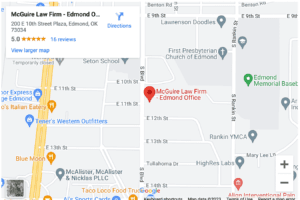Understanding the Statute of Limitations and Your Personal Injury Case

If another party injured you, you might have the right to file a personal injury lawsuit seeking compensation for damages. However, your right to file a lawsuit is restricted by the Oklahoma statute of limitations. Learning more about the statute of limitations for Oklahoma injury cases and your personal injury claim can help you understand the importance of acting promptly to file a claim after an accident or injury.
Why Does Oklahoma Have a Statute of Limitations for Personal Injury Claims?
State laws vary on the time limits for accident victims to file claims. The reasons limiting the time to file legal action after an injury include:
- Assisting the court system to process matters efficiently and in a timely manner
- Ensuring the use of the best available evidence to decide matters of fact (evidence may be destroyed or disappear with time)
- Protecting parties from being sued for old matters because time could negatively impact a proper defense
- Encouraging injured persons to litigate matters promptly
The courts and all parties to the action have a valid interest in ensuring that disputes are litigated timely. Without a compelling or legal justification for failing to meet the deadline for filing claims, a person loses their right to seek compensation through the courts if the statute of limitations expires.
What is the Statute of Limitations for Personal Injury Cases in Oklahoma?

Oklahoma Statute §12-95 sets the statute of limitations for most personal injury cases at two years from the date of injury. Therefore, injured parties have two years to file a car accident or slip and fall accident lawsuit. The deadline is two years from the date of the accident in most cases.
However, there are exceptions to the general two-year statute of limitations. Therefore, it is best to seek legal advice as soon as possible after an accident. It is unwise to assume you have two years to file a lawsuit after being injured.
Can You Extend the Statute of Limitations?

The tolling of the statute of limitations means that the time to file a lawsuit is delayed or extended. There are several instances in which the statute of limitations may be extended for Oklahoma personal injury claims.
Injuries to Children
Minors do not have the legal capacity to file a lawsuit. A parent or legal guardian usually files a personal injury lawsuit on behalf of a minor child.
However, the statute of limitations is tolled when the injured party is a minor. The statute of limitations begins on the person’s 18th birthday. Therefore, they would have until they turn 20 years old to file a lawsuit for a car accident or similar personal injury.
However, the deadline for medical malpractice is different. Oklahoma Statute §12-96 states that a minor has one year from their 18th birthday to file a medical malpractice claim but in no event less than two years from the injury date.
If the medical malpractice occurred before the child’s 12th birthday, a parent or guardian must file the medical malpractice lawsuit within seven years of the injury date.
Defendants Who Flee the State
If a party leaves Oklahoma to avoid a civil lawsuit for damages, Oklahoma Statute §12-98 states that the statute of limitations is tolled until the person returns to the state. Therefore, you generally could have up to two years to sue another party for injury once that party returns to the area.
Medical Malpractice Claims
The discovery rule applies in medical malpractice claims in Oklahoma. Generally, the statute of limitations for medical malpractice claims is two years from the date the person “discovered” the injury.
The date is based on when the injured party knew or should have reasonably known about the injury. The reason for the discovery rule in medical malpractice cases is that the person may not realize for several years that a doctor’s negligence caused the injury or harm. Some medical mistakes could have delayed effects.
Furthermore, doctors control information regarding the patient’s care. Therefore, the doctor might conceal the medical error. As a result, the person may need to get a second opinion from another doctor or seek advice from an expert or medical specialist, which could take additional time.
Incarceration of the At-Fault Party
The court may prosecute the at-fault party for the cause of the injury, as in the case of a DUI accident or assault. If so, the court may toll the statute of limitations until the party is released from jail.
Special Deadlines for Filing Lawsuits Against the Government

The legal theory of sovereign immunity protects government entities from being sued without their permission. However, there are exceptions to this rule.
The Oklahoma Governmental Tort Claims Act makes an exception for injury claims. Therefore, you may sue the government for injuries caused by negligence in certain circumstances. However, the deadline to file a personal injury lawsuit against the government is much shorter.
You must notify the government entity within one year of the injury date. After that, the government has 90 days to deny or approve the claim. If the claim is denied, you have just 180 days from the denial to file a lawsuit.
How Can You Avoid a Problem with the Oklahoma Statute of Limitations?

There could be other exceptions that apply in your case, depending on the facts and circumstances of your injury. In addition, other laws and statutes could impact your legal right to file a personal injury lawsuit. Therefore, the best way to avoid missing a deadline is to talk with a lawyer about your case now.
If you do not file your lawsuit before the statute of limitations expires, you lose your right to seek damages for your injuries. The types of damages you could receive in a personal injury case include:
- The cost of your medical treatment and care
- The loss of income and benefits, including future lost wages
- Disabilities, disfigurement, and permanent impairments
- Decreases in your future earning capacity
- Loss of quality of life and enjoyment of life
- Mental, physical, and emotional pain and suffering
Once you lose your right to pursue action through the court, you cannot legally hold the at-fault party responsible for your damages. In other words, you have no way to “force” the insurance company or the person who caused your accident to reimburse you for your financial losses, pain, and suffering.
Contact a Oklahoma City Personal Injury Lawyer for a Free Consultation
For more information, please contact the Oklahoma City personal injury law firm of McGuire Law Firm at our nearest location to schedule a free consultation today.
McGuire Law Firm - Edmond
200 E 10th Street Plaza
Edmond, OK 73034, United States
(405) 513-5658

